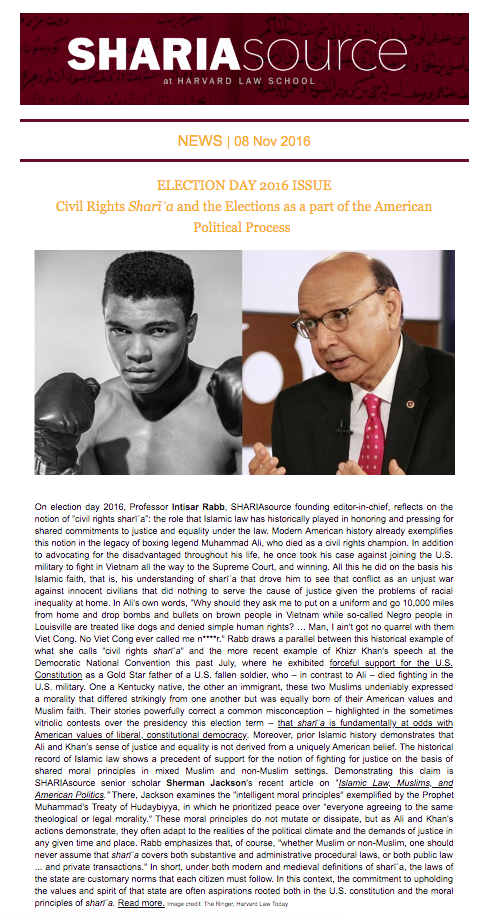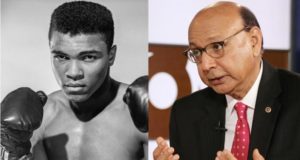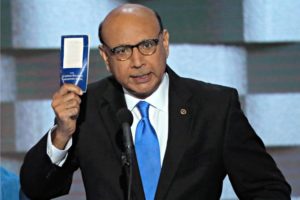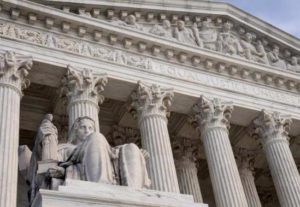
 ELECTION DAY 2016 ISSUE Civil Rights Sharīʿa and the Elections as a part of the American Political Process On election day 2016, Professor Intisar Rabb, SHARIAsource founding editor-in-chief, reflects on the notion of “civil rights sharīʿa”: the role that Islamic law has historically played in honoring and pressing for shared commitments to justice and equality under the law. Modern American history already exemplifies this notion in the legacy of boxing legend Muhammad Ali, who died as a civil rights champion. In addition to advocating for the disadvantaged throughout his life, he once took his case against joining the U.S. military to fight in Vietnam all the way to the Supreme Court, and winning. All this he did on the basis his Islamic faith, that is, his understanding of sharīʿa that drove him to see that conflict as an unjust war against innocent civilians that did nothing to serve the cause of justice given the problems of racial inequality at home. In Ali’s own words, “Why should they ask me to put on a uniform and go 10,000 miles from home and drop bombs and bullets on brown people in Vietnam while so-called Negro people in Louisville are treated like dogs and denied simple human rights? … Man, I ain’t got no quarrel with them Viet Cong. No Viet Cong ever called me n****r.” Rabb draws a parallel between this historical example of what she calls “civil rights sharīʿa” and the more recent example of Khizr Khan’s speech at the Democratic National Convention this past July, where he exhibited forceful support for the U.S. Constitution as a Gold Star father of a U.S. fallen soldier, who – in contrast to Ali – died fighting in the U.S. military. One a Kentucky native, the other an immigrant, these two Muslims undeniably expressed a morality that differed strikingly from one another but was equally born of their American values and Muslim faith. Their stories powerfully correct a common misconception – highlighted in the sometimes vitriolic contests over the presidency this election term – that sharīʿa is fundamentally at odds with American values of liberal, constitutional democracy. Moreover, prior Islamic history demonstrates that Ali and Khan’s sense of justice and equality is not derived from a uniquely American belief. The historical record of Islamic law shows a precedent of support for the notion of fighting for justice on the basis of shared moral principles in mixed Muslim and non-Muslim settings. Demonstrating this claim is SHARIAsource senior scholar Sherman Jackson’s recent article on “Islamic Law, Muslims, and American Politics.” There, Jackson examines the “intelligent moral principles” exemplified by the Prophet Muhammad’s Treaty of Hudaybiyya, in which he prioritized peace over “everyone agreeing to the same theological or legal morality.” These moral principles do not mutate or dissipate, but as Ali and Khan’s actions demonstrate, they often adapt to the realities of the political climate and the demands of justice in any given time and place. Rabb emphasizes that, of course, “whether Muslim or non-Muslim, one should never assume that sharīʿa covers both substantive and administrative procedural laws, or both public law … and private transactions.” In short, under both modern and medieval definitions of sharīʿa, the laws of the state are customary norms that each citizen must follow. In this context, the commitment to upholding the values and spirit of that state are often aspirations rooted both in the U.S. constitution and the moral principles of sharīʿa. Read more. Image credit: The Ringer, Harvard Law Today
ELECTION DAY 2016 ISSUE Civil Rights Sharīʿa and the Elections as a part of the American Political Process On election day 2016, Professor Intisar Rabb, SHARIAsource founding editor-in-chief, reflects on the notion of “civil rights sharīʿa”: the role that Islamic law has historically played in honoring and pressing for shared commitments to justice and equality under the law. Modern American history already exemplifies this notion in the legacy of boxing legend Muhammad Ali, who died as a civil rights champion. In addition to advocating for the disadvantaged throughout his life, he once took his case against joining the U.S. military to fight in Vietnam all the way to the Supreme Court, and winning. All this he did on the basis his Islamic faith, that is, his understanding of sharīʿa that drove him to see that conflict as an unjust war against innocent civilians that did nothing to serve the cause of justice given the problems of racial inequality at home. In Ali’s own words, “Why should they ask me to put on a uniform and go 10,000 miles from home and drop bombs and bullets on brown people in Vietnam while so-called Negro people in Louisville are treated like dogs and denied simple human rights? … Man, I ain’t got no quarrel with them Viet Cong. No Viet Cong ever called me n****r.” Rabb draws a parallel between this historical example of what she calls “civil rights sharīʿa” and the more recent example of Khizr Khan’s speech at the Democratic National Convention this past July, where he exhibited forceful support for the U.S. Constitution as a Gold Star father of a U.S. fallen soldier, who – in contrast to Ali – died fighting in the U.S. military. One a Kentucky native, the other an immigrant, these two Muslims undeniably expressed a morality that differed strikingly from one another but was equally born of their American values and Muslim faith. Their stories powerfully correct a common misconception – highlighted in the sometimes vitriolic contests over the presidency this election term – that sharīʿa is fundamentally at odds with American values of liberal, constitutional democracy. Moreover, prior Islamic history demonstrates that Ali and Khan’s sense of justice and equality is not derived from a uniquely American belief. The historical record of Islamic law shows a precedent of support for the notion of fighting for justice on the basis of shared moral principles in mixed Muslim and non-Muslim settings. Demonstrating this claim is SHARIAsource senior scholar Sherman Jackson’s recent article on “Islamic Law, Muslims, and American Politics.” There, Jackson examines the “intelligent moral principles” exemplified by the Prophet Muhammad’s Treaty of Hudaybiyya, in which he prioritized peace over “everyone agreeing to the same theological or legal morality.” These moral principles do not mutate or dissipate, but as Ali and Khan’s actions demonstrate, they often adapt to the realities of the political climate and the demands of justice in any given time and place. Rabb emphasizes that, of course, “whether Muslim or non-Muslim, one should never assume that sharīʿa covers both substantive and administrative procedural laws, or both public law … and private transactions.” In short, under both modern and medieval definitions of sharīʿa, the laws of the state are customary norms that each citizen must follow. In this context, the commitment to upholding the values and spirit of that state are often aspirations rooted both in the U.S. constitution and the moral principles of sharīʿa. Read more. Image credit: The Ringer, Harvard Law Today
 From Harvard Law Today: A Citizen’s Constitution
From Harvard Law Today: A Citizen’s Constitution
Earlier this year, Harvard Law Today interviewed alumnus Khizr Khan, HLS LL.M. ’86, for its September 6th issue. Khan discussed how the course of his career from Pakistan to the United States shaped his dedication to American constitutional values, even after the death of his son Captain Humayun Khan in Iraq. A Muslim and published author on Islamic law, he says to those who fear sharīʿa and Islam as encroaching upon American values: “They need to read the Constitution. It has safeguards…. I’m an ordinary Muslim, and I … am a protector of the United States … Islam has taught me to be caring, to be kind. My religion is to live peacefully with all other religions and all other peoples. Read more. Image credit: Mike Segar/Reuters
 CASE: Islamic Family Law in U.S. Courts U.S. Editor Abed Awad has been collecting cases of family law related to Islamic law that get litigated as matters of contract in U.S. courts. For each case available in the SHARIAsource portal, Awad summarizes the facts, the issue, and the ruling of each case. From his case summaries, readers can quickly glean and compare how American courts decide family law cases in which prenuptial or/and related contracts contain terms drawn from varied aspects of Islamic law. The courts apply U.S. law to these private contracts, and the outcomes are far from uniform. For example, two cases decided in Virginia, Afghani v. Ghafoorian and Farah v. Farah, demonstrate how American courts can differ in resolving disputes at such intersections of law. (SHARIAsource beta access required). Image Credit: Wikipedia
CASE: Islamic Family Law in U.S. Courts U.S. Editor Abed Awad has been collecting cases of family law related to Islamic law that get litigated as matters of contract in U.S. courts. For each case available in the SHARIAsource portal, Awad summarizes the facts, the issue, and the ruling of each case. From his case summaries, readers can quickly glean and compare how American courts decide family law cases in which prenuptial or/and related contracts contain terms drawn from varied aspects of Islamic law. The courts apply U.S. law to these private contracts, and the outcomes are far from uniform. For example, two cases decided in Virginia, Afghani v. Ghafoorian and Farah v. Farah, demonstrate how American courts can differ in resolving disputes at such intersections of law. (SHARIAsource beta access required). Image Credit: Wikipedia
See the full newsletter.

